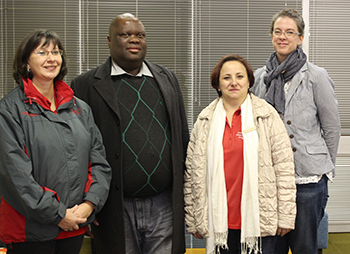Latest News Archive
Please select Category, Year, and then Month to display items
04 April 2024
|
Story Lunga Luthuli
|
Photo SUPPLIED
 Dr Juliet Kamwendo champions gender-inclusive climate action in Africa. Her expertise at the recently held AFR100 workshop highlighted vital steps towards sustainable and equitable development.
Dr Juliet Kamwendo champions gender-inclusive climate action in Africa. Her expertise at the recently held AFR100 workshop highlighted vital steps towards sustainable and equitable development.
Dr Juliet Kamwendo, Lecturer and Programme Director for Gender Studies in the Centre for Gender and Africa Studies at the University of the Free State, is spearheading efforts to integrate gender considerations into Africa's climate restoration agenda. Reflecting on her involvement, Dr Kamwendo stated, "This is particularly crucial, as women make up almost 50% of the population in Africa, and the depletion and degradation of land affect them disproportionately."
She recently served as a gender expert at the AUDA-NEPAD AFR100 workshop in Ouagadougou, Burkina Faso, from 25 to 29 March 2024. This initiative aims to restore forests and degraded land across Africa by 2030, with a focus on gender equality.
The workshop emphasised the integration of gender perspectives into the AFR100 project, acknowledging the disproportionate impact of land degradation on women. Dr Kamwendo's expertise highlighted the need to empower women in climate change interventions, addressing existing gender inequalities exacerbated by environmental degradation.
“Women – who are primarily responsible for household food security and water provision – bear the brunt of environmental degradation, leading to increased workloads, reduced income opportunities, and heightened vulnerability to climate-related disasters. Furthermore, the loss of forest cover and biodiversity further exacerbates the challenges faced by women, particularly in rural areas where they depend heavily on natural resources for their livelihoods,” added Dr Kamwendo.
Her participation highlights academia's crucial role in fostering inclusive and sustainable development, emphasising interdisciplinary collaboration to tackle complex environmental challenges. Through initiatives such as AFR100, stakeholders are working towards a more resilient and gender-responsive future for Africa.
New online journal repository launched during research week
2016-08-03
 Open Access core team.
Open Access core team.The annual research week marked the official launch of KovsieJournals published on KovsieScholar, the UFS output repository. Library and information Services and the office of the Vice Rector: Research, Prof Corli Witthuhn, hosted the week-long events of 26-29 July 2016 on the Bloemfontein Campus.
KovsieScholar is the UFS’s research repository that collects, preserves, and distributes open access digital material. It is an important tool for preserving the university’s legacy, facilitating digital preservation and scholarly communication. It aims to increase the university’s global visibility, the impact and profiles of its researchers, and contribute to the preservation and sharing of knowledge. Currently, it holds journals published since 2010.
The main launch event of 27 July was opened at the Equitas Building’s Senate Hall by Mr Charlie Molepo, Deputy-Director: LIS Research and Scholarly Communications, who also presented the project background. Prof Jonathan Jansen, Vice-Chancellor and Rector said it is a great initiative that will allow anyone to have access to UFS research outputs anywhere in the world, something he is glad to see happening during his term.
A roundtable discussion brought together more than ten senior professors and heads of department to explore topics such as Open Access and its benefits and pitfalls, centralisation of institutional research output, and the future publishing platform of KovsieJournals, amongst others. Research Week will end with training for Open Access and Centre for Teaching and Learning’s core teams.